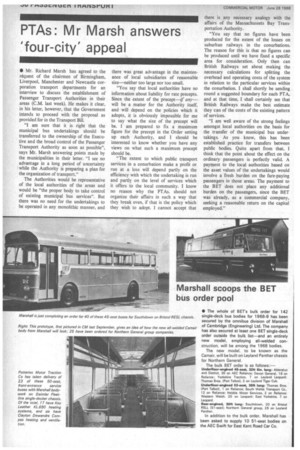PTAs: Mr Marsh answers 'four-city' appeal
Page 32

If you've noticed an error in this article please click here to report it so we can fix it.
• Mr. Richard Marsh has agreed to the request of the chairmen of Birmingham, Liverpool, Manchester and Newcastle corporation transport departments for an interview to discuss the establishment of Passenger Transport Authorities in their areas (C.M. last week). He makes it clear, in his letter, however, that the Government intends to proceed with the proposal as provided for in the Transport Bill.
"I am sure that it is right that the municipal bus undertakings should be transferred to the ownership of the Executive and the broad control of the Passenger Transport Authority as soon as possible", says Mr. Marsh answering points made by the municipalities in their letter. "I see no advantage in a long period of uncertainty while the Authority is preparing a plan for the organization of transport."
The Authorities would be representative of the local authorities of the areas and would be "the proper body to take control of existing municipal bus services". But there was no need for the undertakings to be operated in any monolithic manner, and there was great advantage in the maintenance of local subsidiaries of reasonable size—neither too large nor too small.
"You say that local authorities have no information about liability for rate precepts. Since the extent of the precept-4 any— will be a matter for the Authority itself, and will depend on the policies which it adopts, it is obviously impossible for me to say what the size of the precept will be. I am prepared to fix a maximum figure for the precept in the Order setting up each Authority, and I should be interested to know whether you have any views on what such a maximum precept should be.
"The extent to which public transport services in a conurbation make a profit or run at a loss will depend partly on the efficiency with which the undertaking is run and partly on the level of services which it offers to the local community. I know no reason why the PTAs. should not organize their affairs in such a way that they break even, if that is the policy which they wish to adopt. I cannot accept that there is any necessary analogy with the affairs of the Massachussets Bay Transportation Authority.
"You say that no figures have been produced for the extent of the losses on suburban railways in the conurbations. The reason for this is that no figures can be produced until we have fixed a specific area for consideration. Only then can British Railways set about making the necessary calculations for splitting the overhead and operating costs of the system in relation to the particular services within the conurbation. I shall shortly be sending round a suggested boundary for each PTA, and at that time, I shall certainly see that British Railways make the best estimate they can of the costs of the existing pattern of services.
"I am well aware of the strong feelings amongst local authorities on the basis for the transfer of the municipal bus undertakings. As you know, this has been established practice for transfers between public bodies. Quite apart from that, I think that the point about the effect on the ordinary passengers is perfectly valid. A payment to the local authorities based on the asset values of the undertakings would involve a fresh burden on the fare-paying passengers in those areas. The payment to the BET does not place any additional burden on the passengers, since the BET was already, as a commercial company, seeking a reasonable return on the capital employed."
























































































































